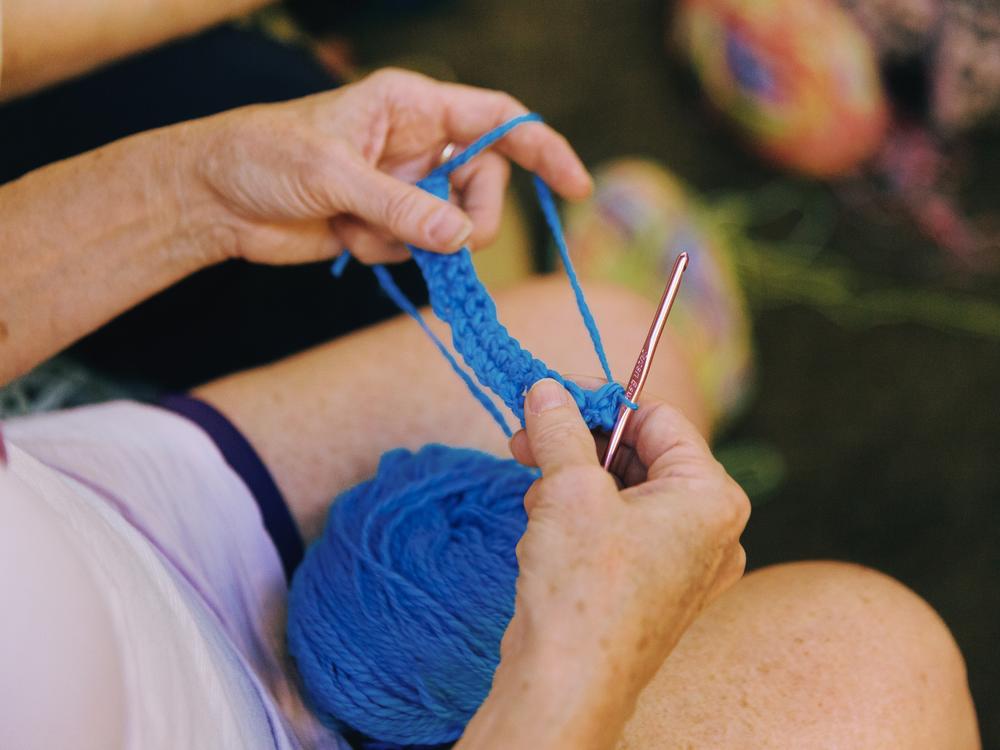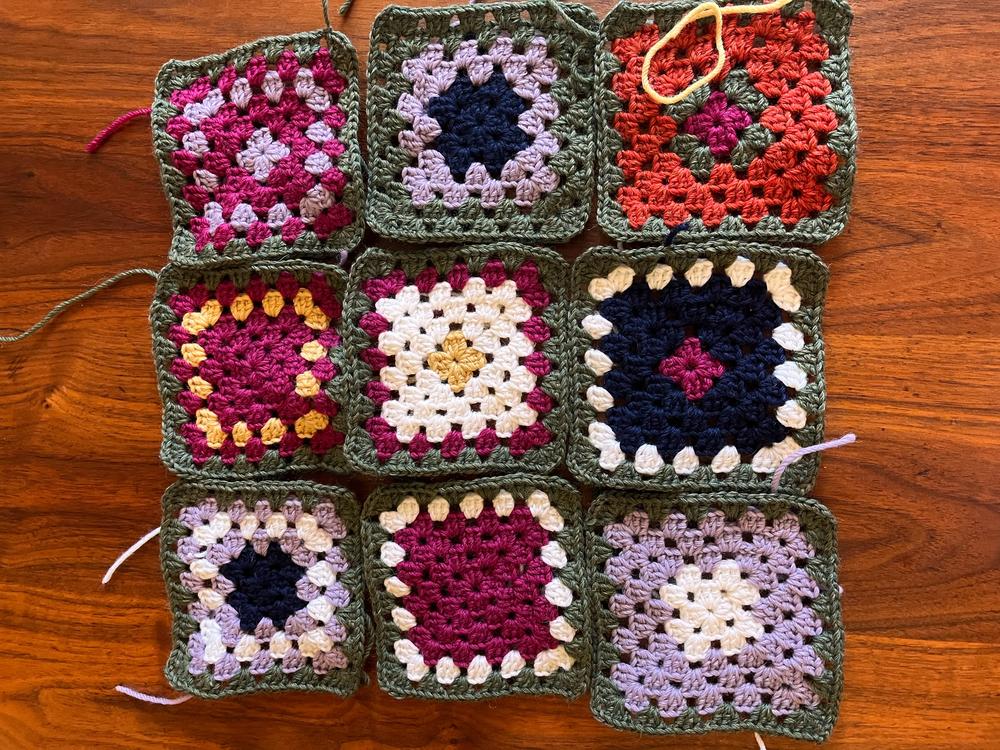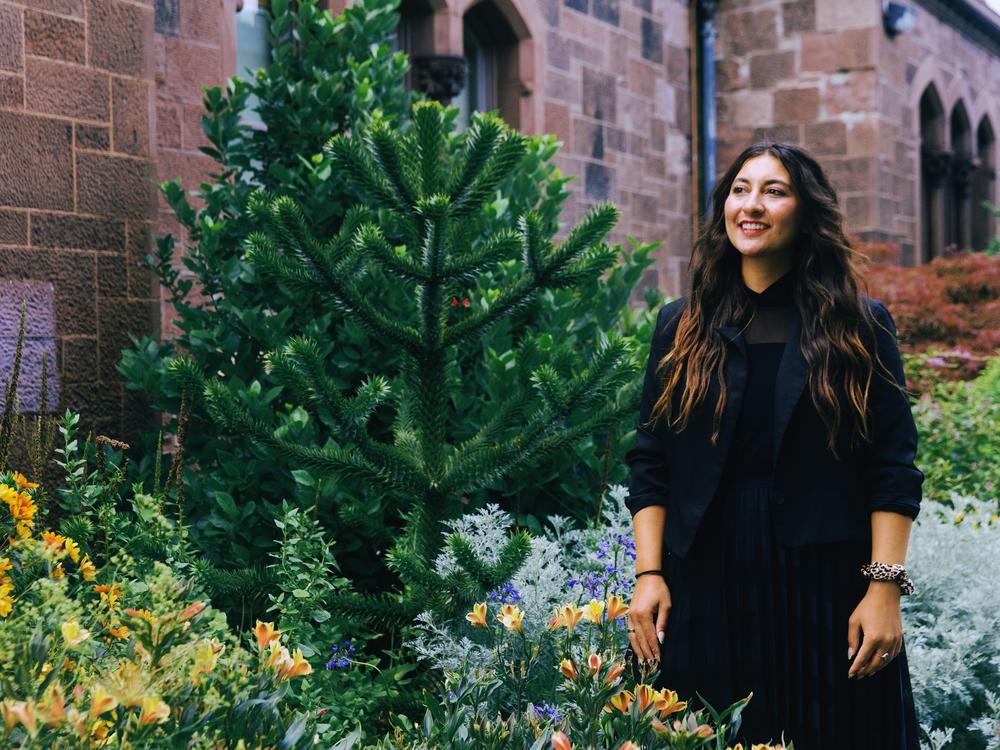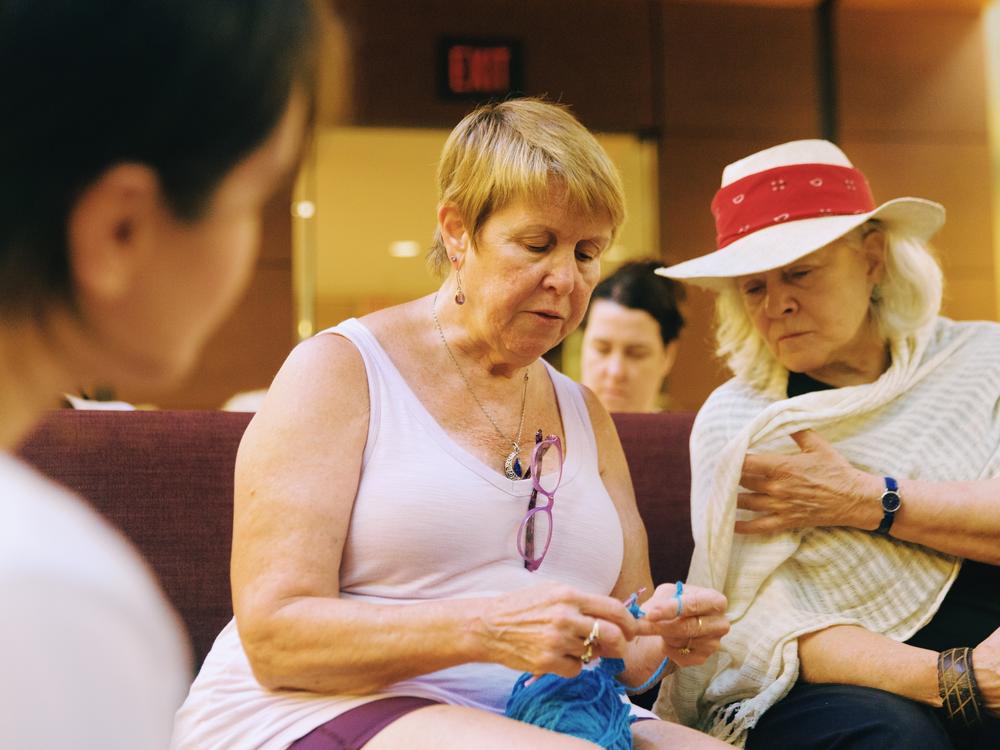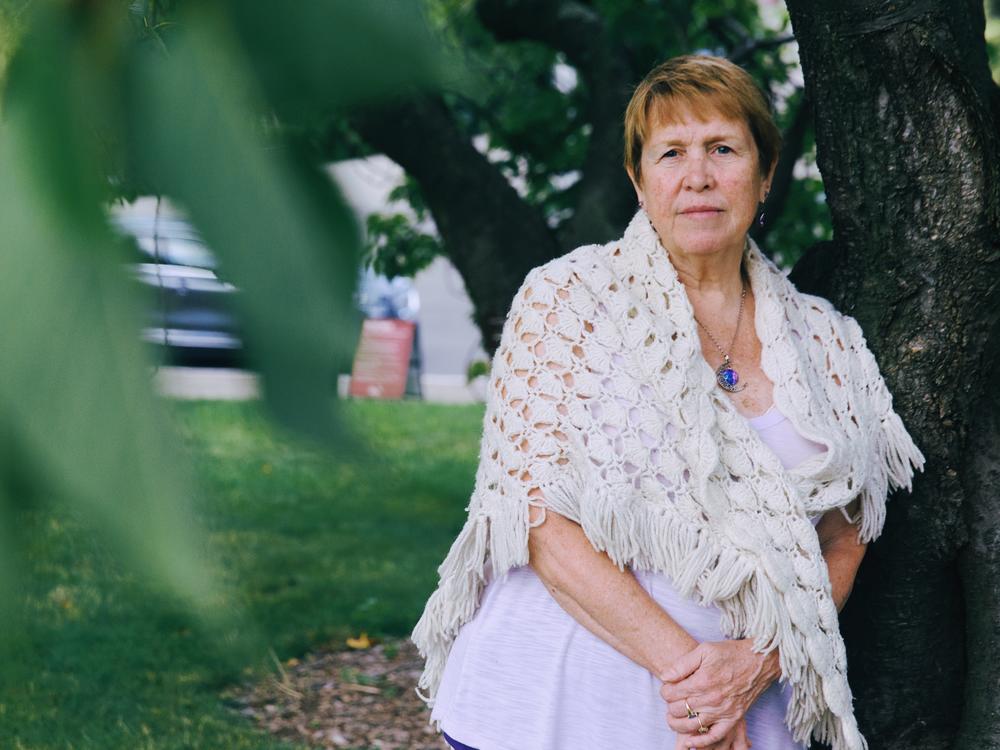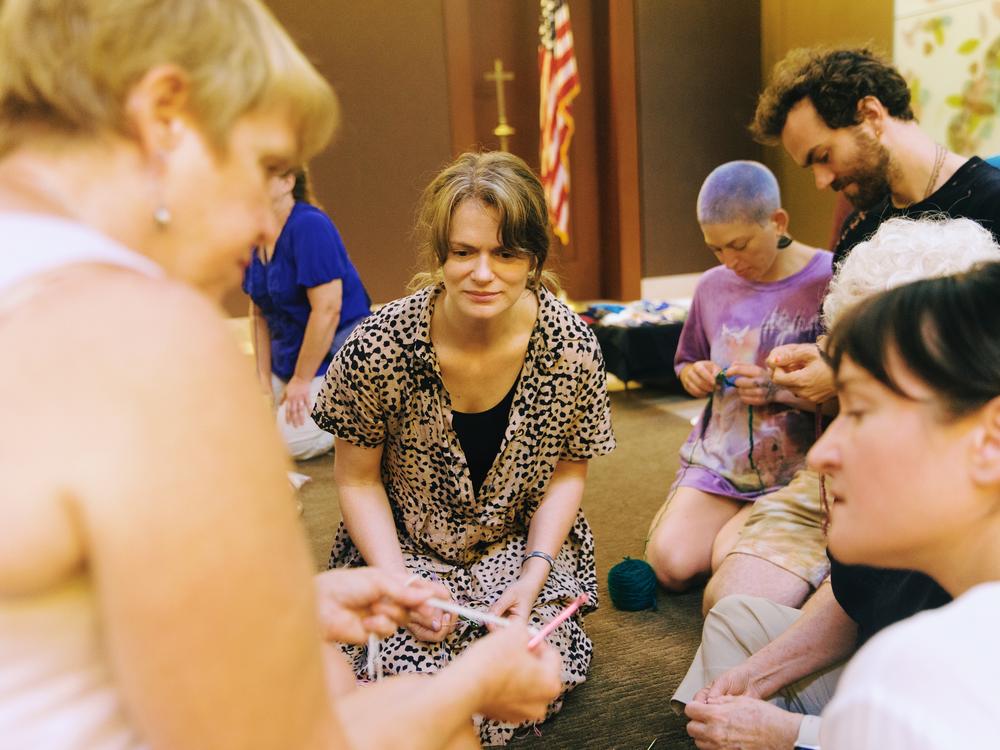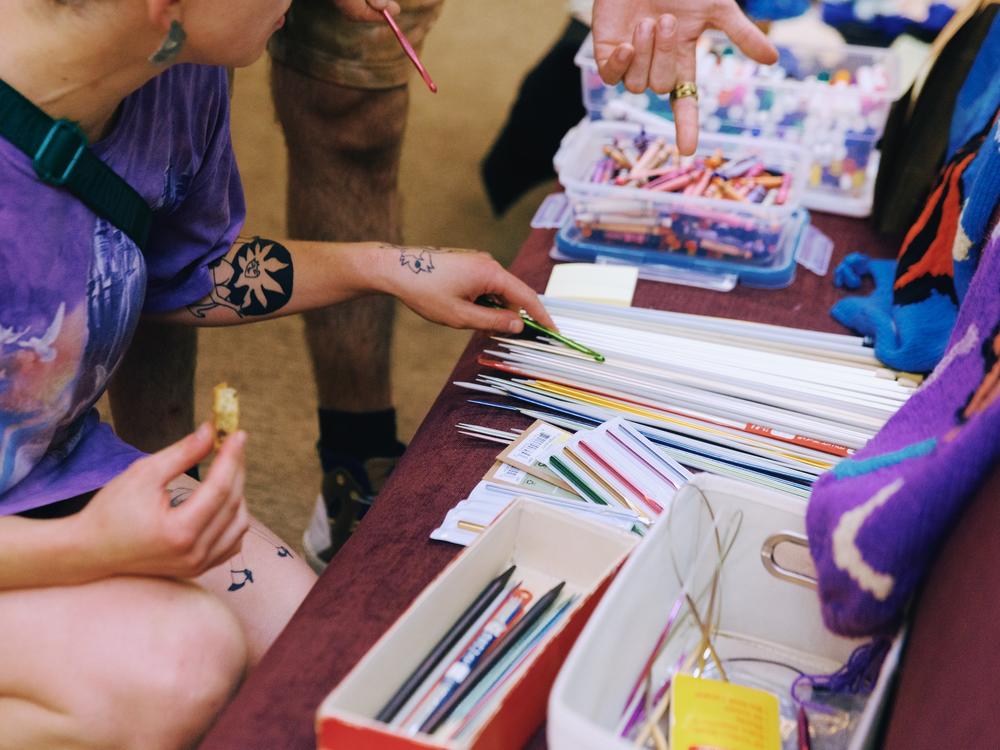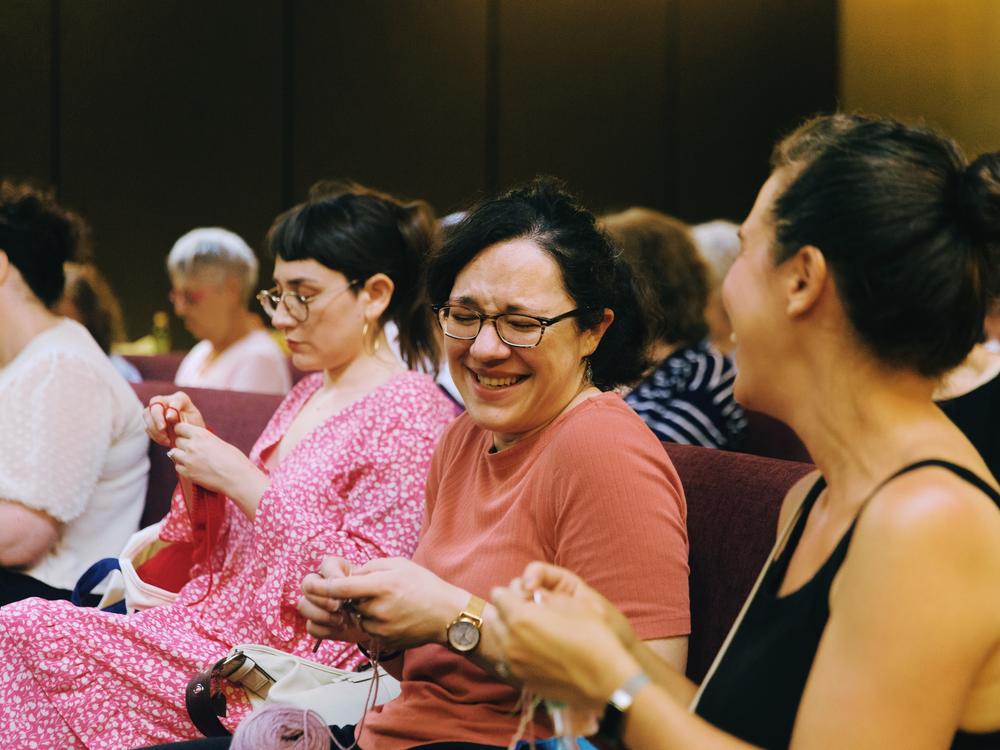Section Branding
Header Content
A death educator and a knitter walk into a cemetery — it's "Grieving & Weaving"
Primary Content
Late last year my dad was diagnosed with amyotrophic lateral sclerosis — or ALS — an objectively terrifying neurodegenerative disease. It’s progressive and fatal. It’s already taken my dad’s ability to talk and eat normally. There is no cure. When he told me about his diagnosis, I knew two things right away: I wanted to spend as much time with him as possible and if I was going to be living in my childhood home, I would need a hobby.
Enter: the granny square.
I’m not very crafty, but I do like textiles. My mom knits, but in her youth, she’d crocheted a granny square blanket and was game to re-learn how to do it. Meanwhile, my dad — who has a funny sense of humor — decided his coping mechanism would be binge-watching “Grey’s Anatomy.” Granny squares and Grey’s became the after dinner routine and soon I was churning out dozens of multicolored squares. And it felt like this project was, maybe, helping?
“It’s incredibly meditative,” says Gabrielle Gatto, a death educator and Manager of Public Programs at Brooklyn’s Green-Wood Cemetery. “And that’s part of ritual. That’s part of really sitting with something.”
On a Tuesday evening, Gatto sets up a snack table inside the cemetery’s chapel, preparing for the start of her monthly interactive workshop, “Grieving & Weaving.”
“I think it was important to have that in the name as well,” she says, laughing a little at her rhyme. “The bold honesty of, hey, we are going to talk about grief. We are going to talk about death, dying and loss. But we're also going to create happy memories together and eat a bunch of food and drink a bunch of things.”
Tess Rafferty is sitting in the front row, knitting a sweater vest out of beautiful copper-colored wool.
“It’s squishy, it sheds, it pills. But I love it. Smells like sheep,” she says.
It’s a project that had been sitting in her closet for months. Earlier this year, after both her grandmothers died, she lost what she calls the “knitting light” for a while. Rafferty, who is also a therapist, says she almost skipped the workshop to stay home with her dog, but she’s glad she didn’t — being here is therapeutic.
“We just don't talk about death, right? Like death education,” she explains. “I think so much of what I struggle with, what my clients struggle with, is trying to ignore the awareness that we are not here forever. Staring that right in the face is empowering in a way.”
One thing to note — even though the series is called “Grieving & Weaving,“ you don’t have to be doing either to participate. Mary Pat Klein, who co-facilitates the event along with Gatto, says they’re just trying to create community.
“Recently somebody asked me — they embroidered, could they come? And it's like, yes, please! So we're trying to open it up. Just come and be creative,” she says.
Klein has been knitting since she was seven years old — she comes from a family of knitters and crafters — she brought quilting squares that her mom cut out long ago and she’s wearing an ivory-colored shawl her grandmother made for her decades ago. Klein is also a professional: she’s knitted items for Broadway and television productions.
They've turned the chapel into something like an art classroom. There’s a huge tub of donated yarn, as well as clay, colored pencils, markers, and books. Klein asks the people filling the pews for a show of hands — is anyone here to learn to knit? To crochet? Several people, including Virginia McLure, say they are.
McLure isn’t grieving a death — but she did recently get divorced — she says she's grieving a time in her life that’s now over. “It’s a new chapter,” she says. “It’s exciting and sad. There’s a lot of like, trying to figure out what to do.” Klein teaches her the single crochet stitch — maybe this is something she’ll like to do.
Some people chat with their fiber friends, others keep to themselves. One attendee is putting the finishing touches on a beaded costume, another is making an ashtray out of clay, and someone else is embroidering a very elaborate dragon. Susan Refice didn’t know what she’d feel like doing, so she brought her entire bag of projects: a cotton and silk test swatch for a future sweater, a crocheted penguin head for her niece, and a blanket.
“When my partner’s mother died — she was a knitter and a crocheter — she had a ton of yarn,” Refice explains. “I raided her stash. So this is yarn that belonged to her.”
Nancy Jewell loved to create. Refice hadn’t even been going out with her partner for a year before Jewell made her a quilt. It has a patch on it that says: “For Susan from David’s mom.”
When Jewell went into a nursing home, Refice thought it would be nice to make her something. So she bought rainbow yarn and made her a shawl.
“It was like, her favorite thing before she passed away,” Refice remembers. “All the people in the nursing home said it looked like butterfly wings.” Refice plans to give the blanket she’s working on now to her partner, something to remember his mom by. And, she adds, there’s also something kind of nice about making something with his mother’s yarn.
“When I’m using her yarn, I think about her. And I think about what she was doing when she originally bought the yarn,” Refice explains. “That’s the nice thing when you make stuff for people, and you think about them, those memories are always going to be there.”
Death educator Gabrielle Gatto says, after all, it’s not the end product that’s the therapy. It’s the act of doing it.
“A big thing with grief is moving through it both mentally and physically,” Gatto says. “And that's exactly what we do here. We bring something that is maybe heavy on our minds or our hearts. And then we work with our hands. We work with it, and we work together.”
I think she’s right. I’ve crocheted several finished blankets, and some unfinished blankets, over about 17 seasons of “Grey’s Anatomy.” But what I’ve loved the most is the ritual — having something to do with my hands, a quiet space for my brain: thinking about the people I’ll give my blankets to and the memories of all the nights I’ve gotten to spend on the couch, just being with my dad.
